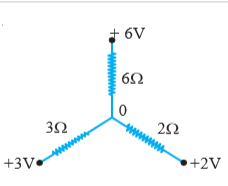What is solute potential?
Step-by-Step Text Solution
1. Definition of Solute Potential:
Solute potential, also known as osmotic potential, is a measure of the potential of water to move through a solution due to the presence of solutes. It is a component of water potential, which is crucial for understanding water movement in plants.
2. Components of Water Potential:
Water potential is composed of two main components: solute potential and pressure potential. Solute potential specifically refers to the effect of solute concentration on the overall water potential of a solution.
3. Effect of Adding Solute:
When solute is added to pure water, the concentration of free water molecules decreases. This is because some of the water molecules are now interacting with the solute particles, which reduces the number of free water molecules available to move.
4. Impact on Water Potential:
As the concentration of solute increases, the water potential of the solution decreases. Pure water has the highest water potential because it has the maximum number of free water molecules. The addition of solute lowers the water potential because there are fewer free water molecules to contribute to the potential energy of the water.
5. Conclusion:
Therefore, solute potential can be defined as the reduction in water potential caused by the presence of solutes in a solution. It is always a negative value or zero, as it represents a decrease in potential compared to pure water.
Solute potential, also known as osmotic potential, is a measure of the potential of water to move through a solution due to the presence of solutes. It is a component of water potential, which is crucial for understanding water movement in plants.
Water potential is composed of two main components: solute potential and pressure potential. Solute potential specifically refers to the effect of solute concentration on the overall water potential of a solution.
When solute is added to pure water, the concentration of free water molecules decreases. This is because some of the water molecules are now interacting with the solute particles, which reduces the number of free water molecules available to move.
As the concentration of solute increases, the water potential of the solution decreases. Pure water has the highest water potential because it has the maximum number of free water molecules. The addition of solute lowers the water potential because there are fewer free water molecules to contribute to the potential energy of the water.
Therefore, solute potential can be defined as the reduction in water potential caused by the presence of solutes in a solution. It is always a negative value or zero, as it represents a decrease in potential compared to pure water.
Similar Questions
Knowledge Check
It a solution at atmospheric pressure has solute potential –15 pascals then :-
AIts water potential will also be –15 pascalsBIts water potential will also be more than –15 pascalsCIts water potential will also be less than –15 pascalsDIts water potential can not be calculated without pressure potentialWhat is the potential of junction O?
 A3VBZeroC−6VDIV
A3VBZeroC−6VDIV
The mor the colute molecules the (A)_____ is the solute potential (ΦS)
View SolutionWhat is biotic potential ?
View SolutionWhat is action potential?
View Solutionolution of which chamber has a lower solute potential?
View SolutionWhat is zeta potential?
View SolutionWhat is the relation between water potential, solute potential, and pressure potential
View Solution
